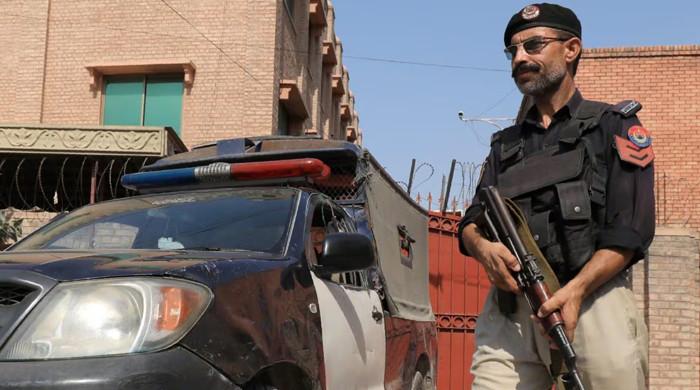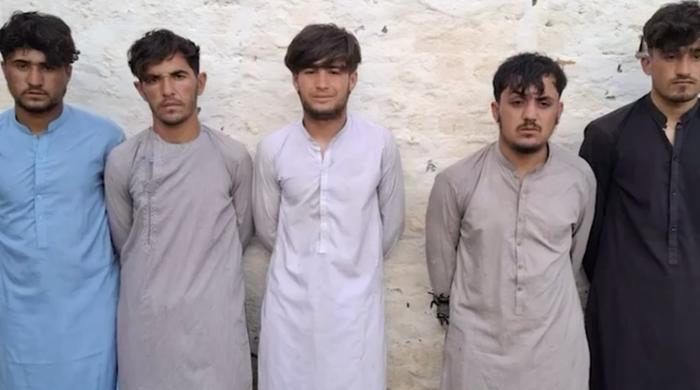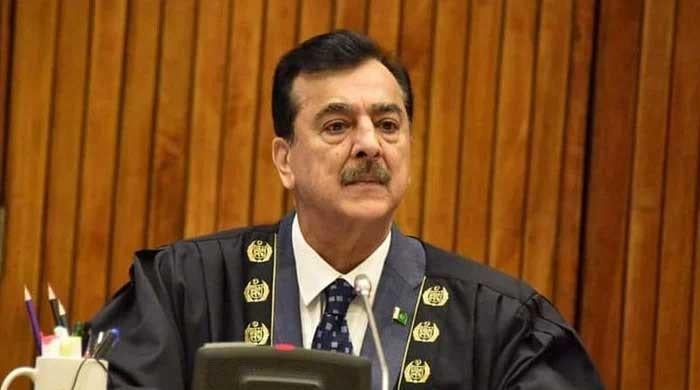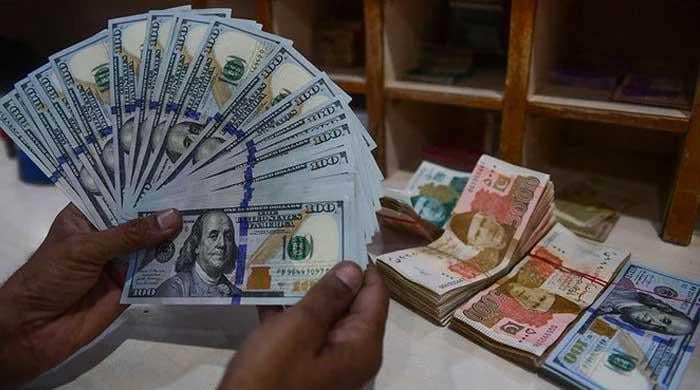Altaf Hussain loses £10m properties case to MQM-P at UK High Court
Judge rules that MQM founder Altaf Hussain had resigned from the party after his August 2016 speech
March 13, 2023
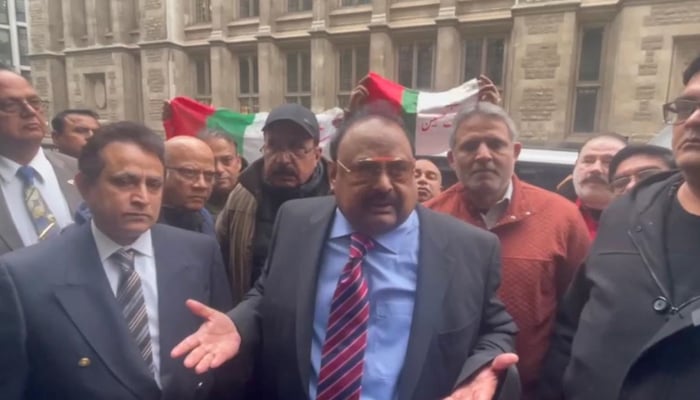
LONDON: Muttahida Qaumi Movement (MQM) founder Altaf Hussain has lost £10 million approximate worth of London properties case to his former loyalists in the MQM-Pakistan (MQM-P) after a legal battle at the UK High Court.
IT Minister Syed Aminul Haque represented the party in the UK court.
Insolvency and Companies Judge Clive Jones, sitting as a High Court Judge in the High Court of Justice Business and Property Court of England and Wales, has ruled that that the MQM-P is the real MQM and its members are the true beneficiaries of the trusts that control London's properties which are currently under the control of Altaf Hussain.
The judge ruled that MQM founder Altaf Hussain had resigned from the party after his August 2016 speech. The judgment means that the UK judge has ruled in the favour of MQM-P led by Khalid Maqbool Siddiqui, and against MQM-London, led by Altaf Hussain.
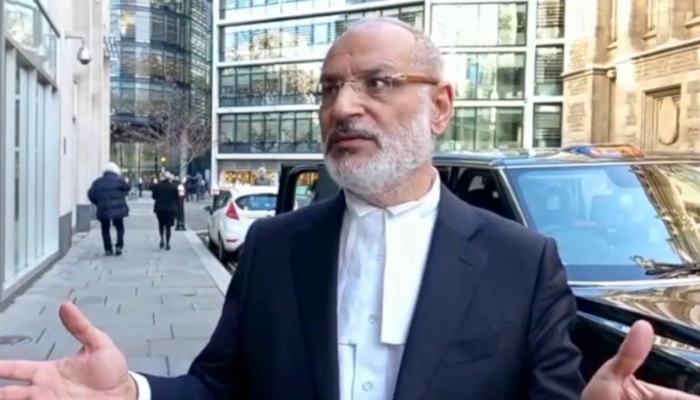
Geo News has received a copy of the judgment exclusively which shows that ICC Judge Jones has ruled that the lawyer acting for Syed Aminul Haque of MQM-P has established that the MQM's April 2016 Constitution was adopted and "it has not been established that the 2015 Constitution was adopted and on the balance of probability it was not."
ICC Judge Jones said in his judgment: "As on 23 August 2016 Mr Altaf Hussain stood down from any role in or involvement with MQM-P. Whether temporarily or permanently that did not alter before his expulsion from MQM-P when he formed a new association operating from London."
The MQM-P and Syed Aminul Haque were represented by Barrister Nazar Mohammad and Hussain and his colleagues were represented by Richard Blake KC.
The case against Altaf Hussain
The case was launched at the UK High Court by MQM-P's Syed Aminul Haque (the claimant, representative/member of Muttahida Quami Movement-Pakistan unincorporated association) against the party's founder Altaf Hussain and other trustees/defendants (Iqbal Hussain, Tariq Mir, Muhammad Anwar, Iftikhar Hussain, Qasim Ali and Euro Property Developments Limited) for the control of the trust that controls the following six properties: 12 Abbey View house in Edgware (where Altaf Hussain lives), High View Gardens first house, High View Gardens second house where Iftikhar Hussain lives with his family, Whitchurch Lane first house which is used as a lodgers house, Whitchurch Lane second house, 53 Brookfield Avenue house (where Saleem Shazad lived with his family) and the MQM 1st Floor Elizabeth House office (once known as International Secretariat).
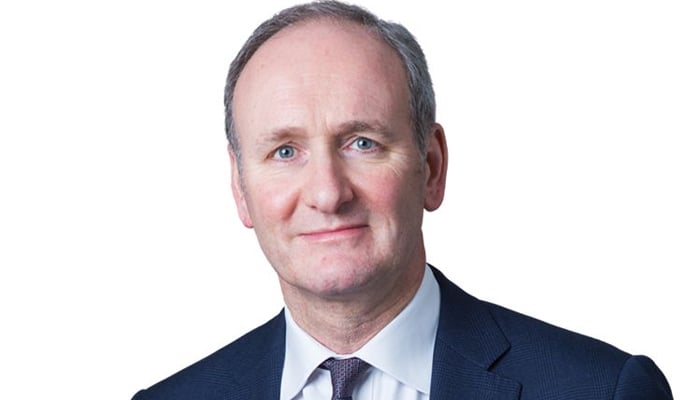
Tariq Mir, Muhammad Anwar and Iqbal Hussain didn't fight MQM-P's claim and stood aside, in agreement with the MQM-P. Former MQM veterans Nadeem Nusrat, who runs his own party called the Voice of Karachi, Dr Farooq Sattar, who also headed his own MQM faction till recently, and former Karachi Mayor Waseem Akhtar supported MQM-P's case and appeared in court against Altaf Hussain, openly confronting their former leader.
All of them stated that that the MQM had not adopted the 2015 constitution and that the 2016 constitution prevailed and existed when Altaf Hussain quit MQM-P voluntarily and then was never admitted again by Dr Farooq Sattar and others.
The UK High Court judgment relates to the first part of the trial and another trial is set to take place soon where different matters including the role of the trustees will be determined, and how the funds which were received in the name of MQM were used for the beneficiaries or not. The MQM-P vs MQM-L case is about the High Court of England and Wales deciding on the facts of the case whether the group led by Altaf Hussain are the beneficiaries of the trusts or the MQM-P represented by Syed Aminul Haque are the beneficiaries.
The issue revolves around the facts of the constitutional history of the organisation and the court is asked to decide whether the 2016 Constitution which MQM-P relies on, which was adopted by MQM's Central Coordination Committee (CCC), or the 2015 Constitution on which Altaf Hussain relies was enforced and applicable in August 2016 and September 2016 when Altaf Hussain left the MQM to form the MQM-L.
Syed Aminul Haque says Altaf Hussain had no leadership role in MQM from 22 August 2016 and that Altaf Hussain did not object to this. The MQM-P says Altaf Hussain's supposed veto power was neutered by his 22 August 2016 letter of apology after his controversial speech.
The MQM-P asserted that the defendants who are the trustees are not conducting the trusts in accordance with the trust deeds; that they were using all the income and assets for their personal gain; and that they should be removed as trustees and be held accountable for the failure of their actions.
Which is the real MQM?
The case was split into two parts — the first was the issue of who is the genuine benefactor: was it MQM-P or MQM-L. In simple terms, this issue could only be decided by establishing which is the real and legal MQM operating since its inception.
During the trial, the MQM-P provided a trail of documents in the form of constitutions which were registered with the Election Commission of Pakistan (ECP). The only constitution which was not a part of the ECP records was the 2015 constitution, which the defendants including Altaf Hussain relied on.
The judgment shows ICC Judge Jones accepted the case advanced by MQM-P and didn't believe in the case presented by Altaf Hussain's legal team.
The defendants' argument was that the 2015 Constitution was the operating one, which gave Altaf Hussain powers under article 9-b of the 2015 Constitution but was unable to establish its provenance, according to the judgment. The judge accepted Altaf Hussain's argument that he did indeed give assent on the 22nd October 2015 to a constitution which had multiple errors in it.
The future of Altaf Hussain
The judgment in the first part of the trial creates a spectre of huge incoming legal difficulties for Altaf Hussain. Now that stage one has been won by the real MQM and the real beneficiary — which is MQM-P according to the UK court — stage two will commence which is where the defendants have to account for all the monies received from the trusts and if they were used for the benefit of the beneficiaries and if they have not then they have breached their duty and will have to pay back all the money.
The conclusion of the judgment says: "A further hearing would be required to decide whether the resolutions passed on 31 August and/or 1 September 2016 breached the April 2016 Constitution. A further hearing is unnecessary. The MQM Constitutional issue is not a defence to the claim against the Defendants as trustees. Even if it was a defence, the decisions on 31 August and/or 1 September 2016 have been superseded by events. The September 2016 Constitution was adopted by the CCC elected on 3 November 2016. The new committee amended the September 2016 Constitution and has adopted by resolution the 2017 Constitution. It remains in force (subject to any later amendment). Even if Article 9(b) could be and is treated as restored and Mr Hussain's expulsion set aside, which is not relief the active defendants seek or which they could seek as trustees, the decision to bring a claim."
MQM-P leader Syed Aminul Haque started the case on 3 September 2020 at the UK High Court on behalf of the membership of MQM-P asking the court: to remove or substitute the current trustees; for relief to prevent misappropriation; and for orders to recover trust assets including rental income.
The MQM-P argued in the claim that Hussain and other defendants had failed to keep the books and records required of them as trustees and had failed to account for their use of the properties including the income received from them and the net proceeds of the sale, and there has been a misuse of trust assets for personal use and/or for the use of third parties.
ICC Judge Jones noted in the judgment: "It is apparent from this statement of fact that the roots of the claim date back to what occurred after a speech on 22 August 2016 by MQM's founder and ideologue, Altaf Hussain. The speech, which was broadcast from London to the membership of MQM in Pakistan, resulted in unrest, principally in Karachi. There was intervention by the authorities amidst scenes of violence. The next day Altaf Hussain publicly apologised and stated he would step away from any active involvement with MQM. It is in dispute between MQM-P and the active defendants whether his expressed decision was temporary or permanent. In addition, whether the decision permitted or enabled amendments to MQM's constitution on 31 August and 1 September 2016 ("the September 2016 Constitution") without having first sought his guidance, assent and/or ratification. The amendments included the removal of any role Altaf Hussain had within MQM. It is also in dispute whether MQM became known as MQM-P or whether, as the active defendants assert, MQM-P is a new political party formed by Dr Sattar and others who (or some of whom) have caused this claim to be made by falsely claiming to be MQM."
The judge wrote that there is no dispute that MQM-P engaged in elections after August 2016 at all levels of government.
"It is registered as a political party in Pakistan in accordance with the requirements of the Elections Act 2017. Its constitution (as amended from time to time) is lodged with Pakistan's Electoral Commission. It is accepted that MQM is no longer registered as a political party unless its name was changed to and it now is MQM-P."
Altaf Hussain's arguments
The case of Altaf Hussain and his associates was that MQM was registered as a political party in 1987 but from August 2016 its registration was prohibited by the "military establishment" and the MQM-P was hurriedly created after the speech in August 2016 as a result of a "military crackdown" on MQM "to enjoy the patronage and protection of the military authorities whilst masquerading as the same organisation as MQM to the outside world".
Hussain's defence argued that the MQM-P for the purpose of its registration as a political party wrongly notified the Electoral Commission that MQM had changed its name to MQM-P. However, the judge did not agree to any form of pressure and concluded that it was not his role to ascertain whether any external pressure existed.
The MQM-L told the court that MQM-P wrongly registered the September 2016 Constitution in place of MQM's constitution as adopted in October 2015 which had replaced/amended the constitution MQM had adopted by an amendment in 2012 ["the 2012 Constitution"] and that Altaf Hussain could not be removed as founder and leader of MQM as the September 2016 Constitution purported to do.
Hussain had disputed that he had previously handed over power or otherwise stepped down from his role following the speech he made on 22 August 2016. Hussain was not and could not be removed by the meetings on 31 August and 1 September 2016 and MQM remained in existence under his leadership, his lawyer argued.
Hussain had stressed that the MQM-P had no interest in the properties and no right to bring these proceedings or make any claim against the defendants.
About Altaf Hussain's apology after the 22nd August 2016 speech, Slake KC submitted it was plainly a temporary solution to a difficult political scenario that had developed.
"It could not justify the changes to the 2015 Constitution or to the April 2016 Constitution if that in fact applied which denuded Altaf Hussain, the father of MQM, of his role permanently."
The trial
During the trial that lasted nearly two weeks in November last year, there were heated exchanges and clashes between the two sides.
Nadeem Nusrat appeared in person to stand against Hussain and had told the court his life could be in danger therefore he should be given security. Altaf Hussain had branded his former loyalists as "traitors" who abandoned their own father and ideologue.
The trial heard how MQM-L destroyed the famous BT recording system, along with other equipment for the time around the events of the 2016 speech and when the changes to the constitution were taking place.
The court heard how MQM-P lost control of its email which was used to exchange the 2015 draft constitution with the MQM's International Secretariat.
The court was told that Hussain had resigned previously from the leadership but his followers requested his comeback, however, on this occasion, the followers did not deem it necessary to have him come back as the leader.
The MQM-P claim relied on material evidence from previous court cases in which Hussain had deposed that these properties are held in trust for the MQM. For instance, during the divorce settlement with his former wife, which included a lump sum payment of £1.5 million and monthly payments of £15,000 per month to his wife, Hussain had maintained these properties in question were trust properties held specifically for the MQM-P and he did not have a personal interest in them.
Prior to the start of the MQM-P case, MQM's former senior leaders Muhammad Anwar and Tariq Mir had told Hussain that they will not hand over control of the two Whitchurch Lane properties.
The MQM-London said that Hussain will soon issue his reaction to the judgment and will announce the next steps. It's understood he will appeal.






